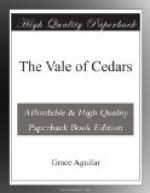But he did linger, till once more he had drawn from her a confession of her love, that none other could take his place, even while she conjured him never to seek her again—and so they parted. Five minutes more, and there was not a vestige of a human form on the wide-extended plain.
CHAPTER III.
“Now History unfolds her ample page,
Rich with the spoils of Time.”
Clearly to comprehend the internal condition of Spain at the period of our narrative (1479)—a condition which, though apparently purely national, had influence over every domestic hearth—it is necessary to glance back a few years. The various petty Sovereignties into which Spain had been divided never permitted any lengthened period of peace; but these had at length merged into two great kingdoms, under the names of Arragon and Castile. The form of both governments was monarchical; but the genius of the former was purely republican, and the power of the sovereign so circumscribed by the Junta, the Justicia, and the Holy Brotherhood, that the vices or follies of the monarch were of less consequence, in a national point of view, in Arragon, than in any other kingdom. It was not so with Castile. From the death of Henry the Third, in 1404, a series of foreign and civil disasters had plunged the kingdom in a state of anarchy and misery. John the Second had some virtues as an individual, but none as a king; and his son Henry, who succeeded him in 1450, had neither the one nor the other. Governed as his father had been, entirely by favorites, the discontent of all classes of his subjects rapidly increased; the people were disgusted and furious at the extravagance of the monarch’s minion; the nobles, fired at his insolence; and an utter contempt of the king, increased the virulence of the popular ferment. Unmindful of the disgrace attendant on his divorce from Blanche of Navarre, Henry sought and obtained the hand of Joanna, Princess of Portugal, whose ambition and unprincipled intrigues heightened the ill-favor with which he was already regarded. The court of Castile, once so famous for chastity and honor, sank to the lowest ebb of infamy, the shadow of which, seeming to extend over the whole land, affected nobles and people with its baleful influence. All law was at an end: the people, even while they murmured against the King, followed his evil example; and history shrinks from the scenes of debauchery and licentiousness, robbery and murder, which desecrated the land. But this state of things could not last long, while there still remained some noble hearts amongst the Castilians. Five years after their marriage, the Queen was said to have given birth to a daughter, whom Henry declared should be his successor, in lieu of his young brother Alfonso (John’s son, by a second wife, Isabella of Portugal). This child the nobles refused to receive, believing and declaring that she was not Henry’s daughter, and arrogated to themselves the right of trying and passing sentence on their Sovereign, who, by his weak, flagitious conduct had, they unanimously declared, forfeited all right even to the present possession of the crown.




